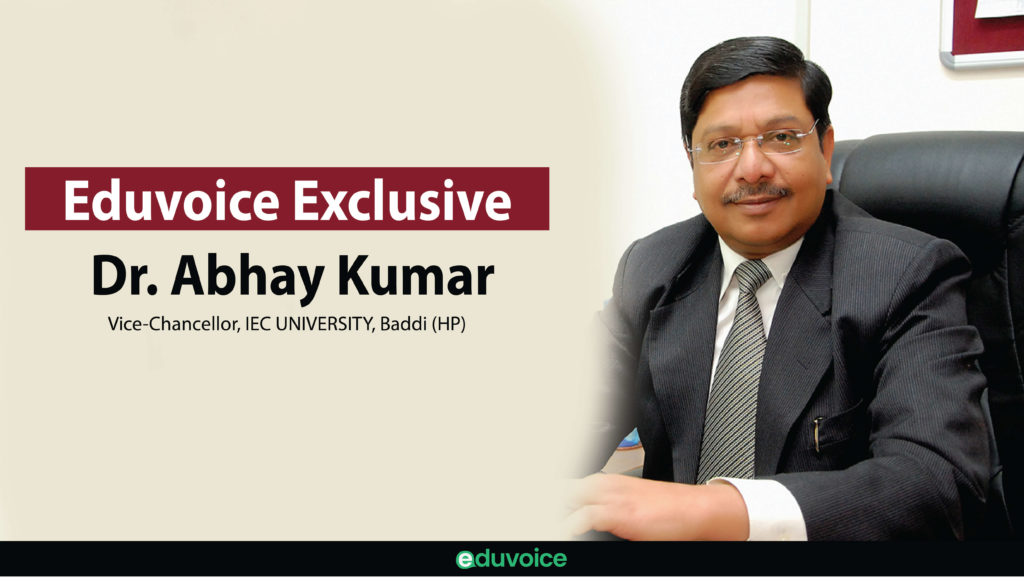Eduvoice exclusive interview

Dr. Abhay Kumar
Vice-Chancellor, IEC University, Baddi (Himachal Pradesh)
Has more than 19 years of experience in Teaching and Research and total experience of more than 38 years
Has also been the Principal Investigator of Govt. Sponsored Projects during his career
Has been supervising Ph.D, M.Phil. and MBA students in their research work and projects
“Progress cannot come without change. Those who cannot change their minds can never be a part of the progress.“- George Bernard Shaw.
introduction
The growth that was expected in 5 years towards the teaching methods of online education has been highly accelerated, owing to the COVID-19 pandemic. Every college and university has adapted various ways of online teaching, be it via live video sessions, or recorded lectures.
In this insightful interview that I had with Dr. Abhay Kumar, who is the Vice Chancellor at IEC UNIVERSITY, Baddi (HP), discussed various methods of online education. He also spoke about how we can combat the placement problems that students will face, and how we need to mentor the students.
Let us learn more about online education and its future, in this interview.

Sujata Mehta
We all know that the COVID pandemic has impacted the whole world, and the education industry is no exception there. We are tackling it with live sessions, online exams, etc.
So, what is your take on this? How will it affect this particular batch, what losses will they suffer, and what are your plans to minimize them?

Dr. Abhay Kumar
First of all, I would like to express my sincere gratitude to Eduvoice for allowing me to interact with you and speak what I think about the education system and the COVID 19 pandemic. As we know, the COVID 19 pandemic has compelled organizations across the world to think outside the box. We have to evolve and adapt as per the changing dynamics of the education industry.
Let me start with the initiation of the crisis. When the lockdown started, it was very sudden, and the faculty members did their best to impart knowledge to the students, through various online platforms. Whether it was uploading lectures on youtube, sending them course material through email, or putting it up on the website, and then using platforms like zoom, google classrooms; just so that the imparting of knowledge would not suffer.
However, there was a word of caution. We could reach only 75% of the students. The reasons being connectivity and accessibility. The other reason being adaptability. I’ll be very honest about these two aspects.
When we talk about connectivity and accessibility, students staying in hilly areas of Himachal and distant villages, they lack gadgets and cannot continue doing online studies. They face problems of connectivity, and if the internet is available, the speed of the internet is an issue.
Let me talk about capability. Teaching in a classroom is very different. The curricular design for teaching in a classroom is very different from what course material is to be uploaded on the online platform. Our teachers also have to adapt to new technology.
What we could not have achieved in the past 5 years and what would have taken the next 5 years to mature at, we have achieved it in the last 45 days! So of course, glitches are bound to happen. One of the glitches is that we need to retrain the teachers.
A professor can be very good at classroom teaching pedagogy, but he or she may not be very good at teaching online.
So we have to retrain our teachers, and they have to upskill and upgrade themselves, that is for sure.
At IEC University, we are trying our best to upgrade them. We are having certain online training modules for the teachers.
SUBSCRIBE TO OUR NEWSLETTER
Get latest updates about our Exclusive Interviews, News, Articles on Higher Education Sector.

Sujata Mehta
What would you focus upon, recorded sessions or live sessions? What is your preference and please explain the reason?

dr. abhay kumar
You just cannot use one mode at present. It has to be a blended, hybrid learning form.
Our students have usually been silent learners in the past. If we want to make them self-learners, we have to give them material to go through, which they can study at their own pace because this is different for every student.
Once the material through online platforms is offered to them, we conduct a zoom call or a live online session where teachers discuss what was taught in the recorded lecture. If the students have any difficulties with the material, they can contact the professors, ask them questions and get their doubts cleared.

Sujata Mehta
As we know, during the pandemic, companies are facing an economic recession. How do you think this has influenced placements? How can we resolve this issue?

dr. abhay kumar
I completely agree with you, the industry itself is going through a rough patch. In many organizations, there have been lay-offs. Many of the offer letters that students might have gotten previously, now stand withdrawn. So there may be a feeling of despair among some of them.
But what is needed at this point is that we have to mentor and counsel our students. This is the first step.
We at IEC University have started online classes for mental wellness; some of them have been taken by me, some by other experts. These are being conducted so that students are fully versed with the fact, that they must stay positive during this pandemic. They should not always be overexposed to the media, and their psycho-social and mental well-being should be in place.
The second thing Is that all is not lost if one offer letter is taken away. Even if they could not get employment in the big organization that they were selected by, they are being motivated to take the next best employment, which they will and they should take; as per our discussions with them.
IEC University is situated in Baddi, which is the biggest pharma hub in Asia. We have a lot of connections with organizations here and we have been talking to them. Thus, we got some students placed. Maybe they are underemployed as per their capability, but they are placed. We are even going online for placement activities with certain industries with whom we have had contacts in the past.
Third, we have been asking students to do certain certification courses in various skills. Now, the choice of those certificate courses should be proper. Students cannot do any certificate course and think that they will get an added benefit. They must choose it judiciously.
If they talk to the faculty members, the Deans, the HODs, they will guide the students about what is needed in this specific program and so they can make the right choice of the certificate course.
Moreover, I would like to emphasize that the need of the day is to promote entrepreneurship.
“One student can get a job in one company, but three students can come together and run their start-up.”
We have already had one or two start-ups thanks to the incubation cell, in the past one or two years.
We are waiting for the lockdown to finish, then we will be calling the students with all the proper sanitization, decontamination, and social distancing being taken care of. Once they come back, we will be giving them certain business ideas. Perhaps they would also have some ideas of their own, and hence this will help them in the paths of start-ups and entrepreneurship in the times to come.
This would hold good for the first, second, and third-year students; but what about the final year students?
They can’t go for start-ups immediately.
So for them, we have to make sure that they get a placement here. As I said earlier, they may be underemployed, but at least they are not unemployed. So that is our objective right now, and that is how we are proceeding.

Sujata Mehta
How is your college combating and preparing for the next year? For example, if this lockdown gets extended for six months, then how are you going to take sessions of the curriculum and other types of sessions?





